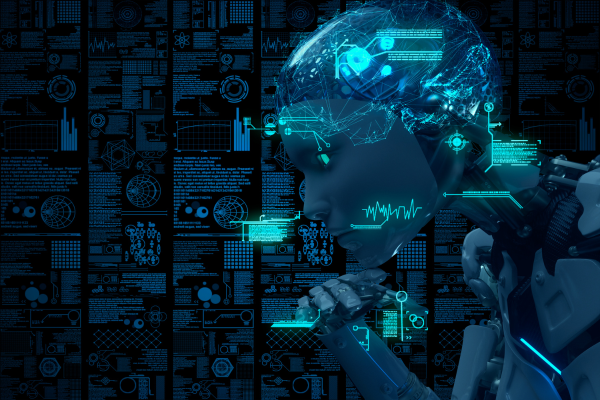As the digital landscape continues to evolve, the demand for visually appealing and user-friendly websites has grown exponentially. A well-designed website is crucial for any business, as it helps them build their brand identity, engage with their audience, and, ultimately, drive conversions. With the advent of artificial intelligence (AI) technology, the world of website design is witnessing a paradigm shift, as their imaginations and skill sets no longer limit designers. This article will delve into the realm of website design and explore AI’s impact on the industry.
The Role of AI in Website Design
Traditionally, website design has been a labour-intensive process that requires a keen eye for aesthetics, strong coding skills, and the ability to translate abstract concepts into user-friendly layouts. However, with the introduction of AI, the design process is becoming more streamlined and efficient. AI-powered tools and algorithms are now capable of assisting designers in various aspects of website design, including:
- Layout Design: AI can quickly generate website layouts that are both visually appealing and functionally effective. By analyzing existing designs and user preferences, AI algorithms can predict the most engaging designs and create new layouts based on that data.
- Colour Scheme Selection: Selecting the right colour palette for a website can be challenging. AI-powered tools can analyze the target audience’s preferences and recommend suitable colour schemes that align with the brand’s identity.
- Typography: AI can recommend the most effective font styles, sizes, and combinations based on user preferences, thus helping designers create visually appealing and easily readable websites.
- Image Optimization: AI algorithms can automatically analyze images, optimize their quality, and recommend the best placement within the website’s layout.
- A/B Testing: AI can conduct A/B testing on different design elements to help designers understand which version of their website performs better, allowing them to make data-driven decisions when refining their designs.
- Accessibility: AI tools can evaluate websites for accessibility issues and provide recommendations on improving the user experience for all visitors, including those with disabilities.
Personalization and User Experience
One of the key benefits of integrating AI in website design is the ability to create highly personalized user experiences. By analyzing user behaviour, preferences, and browsing history, AI algorithms can tailor the website’s content and layout to suit individual users. This level of personalization can significantly improve user engagement, encourage return visits, and ultimately increase conversion rates.
Moreover, AI can help designers identify user pain points and areas where users struggle to navigate or interact with the website. By analyzing user data, AI can provide insights that enable designers to make targeted improvements to the website’s layout, navigation, and overall usability.
The Rise of AI-Generated Websites
AI-powered tools’ increased efficiency and effectiveness have led to the emergence of AI-generated websites. These websites are designed and built entirely by AI algorithms, with minimal human intervention. While this may seem futuristic, AI-generated websites are already becoming a reality.
Platforms such as Wix ADI (Artificial Design Intelligence) and The Grid allow users to input their preferences and requirements. Then the AI algorithm generates a fully functional and visually appealing website within minutes. This technology saves time and resources and democratizes the website design process, enabling individuals and small businesses to create professional websites without the need for extensive design or coding knowledge.
The Ethical Implications of AI in Website Design
As with any technology, integrating AI in website design raises ethical concerns. One of the primary concerns is the potential for AI-generated techniques to replace human designers. While AI can streamline the design process and augment human creativity, it is essential to strike a balance that ensures human designers’ continued value and relevance in the industry.
Another ethical concern is the potential misuse of personal user data collected by AI algorithms. Data privacy and responsible use of collected information are critical to maintaining user trust and adhering to legal and ethical standards. Designers and developers must ensure that AI-powered tools and platforms prioritize data privacy and comply with applicable regulations.
The impact of AI-generated content on intellectual property rights is also a topic of debate. As AI-generated websites and designs become more common, it raises questions about the ownership and copyright of these creations. Legal frameworks should be adapted quickly to address these concerns and ensure fair attribution and protection of intellectual property rights.
The Future of AI in Website Design
As AI advances, its impact on website design will only grow. We can expect to see more sophisticated AI-powered tools that will enable designers to create even more innovative and engaging websites. Some potential advancements include:
- Greater integration of voice assistants and chatbots: As voice assistants and chatbots become more advanced, their integration into website design will enable more seamless and intuitive user interactions.
- Improved predictive analytics: AI algorithms will become better at predicting user preferences and behaviour, enabling designers to create websites that are even more personalized and engaging.
- Enhanced 3D and virtual reality experiences: AI-powered tools will help designers create immersive 3D and virtual reality experiences that enhance user engagement and offer unique ways to interact with websites.
- Collaborative AI design platforms: AI will facilitate real-time collaboration between designers, enabling them to work together more efficiently and effectively on complex projects.
- AI-driven content generation: AI algorithms will become more adept at generating written, visual, and interactive content tailored to specific audiences, further enhancing the personalization of websites.
In conclusion, integrating AI into website design holds immense potential to revolutionize the industry. While it is essential to consider the ethical implications of AI’s growing role in design, the potential benefits of efficiency, personalization, and innovation are undeniable. As web designers and developers continue to embrace AI, we can look forward to an exciting future where technology and human creativity work hand-in-hand to create engaging and memorable digital experiences.

